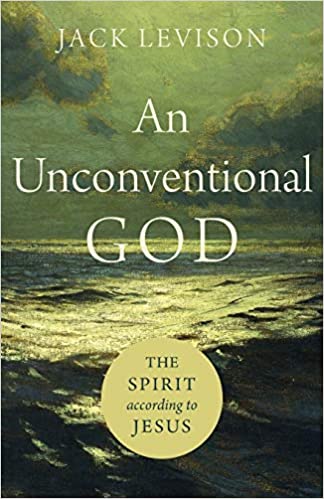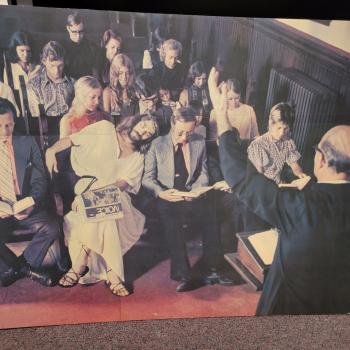BEN: One of the more critical insights in the following chapter is as follows—” the truth—the tragedy—is that the Holy Spirit will not give believers words of successful self-defense. The Spirit is not an escape clause or a defense attorney.” (p. 122), but the Spirit does give the speaker words to witness by to the authorities. This comports well with the theology of faithful witness even unto death stressed in Revelation. And it is so very alien to modern escapist theologies that urge things like ‘if you have enough faith you won’t have to suffer’ or ‘God will work things out so you will be protected from harm’ or even worse ‘when the tribulation comes God will beam you up’. Of these views, the Gospel writers say nothing positive. Indeed, Jesus even says had the tribulation not been shortened none of God’s elect would stand, which suggests we should expect to go through it. How would you suggest we disabuse the church of these false theologies of suffering avoidance, and of the assumption that the Holy Spirit is like a giant seat belt preventing us from harm in a crash situation?
JACK: What do we do? We read An Unconventional God: The Spirit according to Jesus! And when we are done reading An Unconventional God, we read A Boundless God: The Spirit according to the Old Testament. And then we train ourselves to study the gospels in light of the Old Testament, which is how they were written. Full stop!
BEN: You are surely right that the promise of the Spirit giving the appropriate words of witness is not a universal promise for all situations but quite specifically for Christians facing persecution, prosecution, and even execution. Then, the Spirit gives them utterance. I was thinking the other day about the young girl at Columbine who stood up bravely before the crazed young gunman and when asked ‘are you a Christian’ she said ‘yes I am’ and was killed. It’s that kind of bravery and testimony I think Jesus is talking about surely. I remember Corrie Ten Boom’s father telling her that if the Nazis come to the door asking if Jews are in the house, God will give her the words at that time to say. I’m afraid that all too often we take these sorts of promises out of context and actually violate the very spirit and intent of the saying. But when we are dealing with people who are never, and perhaps never likely in those kinds of dangerous situations, how do we teach people about this without watering down or making innocuous the teaching?
JACK: I think we need to remember that these sayings are, first and foremost, sayings of Jesus. They are his story first. They are his words first. The point of the gospels is, first and foremost, to drive us back to the story of Jesus. What do these sayings tell us about Jesus? That should be the question we ask, yes, foremost and first.
When I taught at Seattle Pacific University, many of our students worked with Young Life in high schools. We talked about the message, “God can fill a need in your life.” True enough. But the real message should be an invitation to join in God’s story, “You can find a place in God’s story.” The gospels should lead us first to Jesus and, in that light, to an understanding of who we are.
BEN: In probing the ‘Gospel according to Osteen’ and other prosperity Gospel preachers, one of the things that seems to underlie the health and wealth Gospel is a default assumption that this life is worth preserving at all costs, and also worth indulging whatever the cost, as long as one avoids obvious immorality of various sorts. And behind that is the ‘this life is all there is really, so we should grab for the gusto while we can’— carpe diem, or in Osteen’s case ‘carpe per diem’! As you say (p. 132) the real Gospel has been engaged for a soppy and sloppy spirituality, which oddly enough gives one permission to preach a Gospel of current health and wealth. What I find striking about this is that it involves the failure to really grasp the importance of the saying ‘this life is not all there is, we are resident aliens in this world and should not become too attached to it’. Whether one focuses like the old spirituals on going to heaven or one has a robust eschatology of Jesus is coming and our final destination is in the new creation here after the resurrection, neither sort of vibrant afterlife theology seems to guide, guard, or inform the prosperity Gospel people. It’s all about the here and now, and not about ‘the form of this world is already passing away’ so we should live with some detachment not obsessive attachment to the things of this world. You have some rather strong things to say about distortions of the real Gospel, including a misreading of the role of lives. How do we correct such misreadings without completely alienating an audience already stressed out by pandemics, racial unrest, wildfires etc.?
JACK: Perhaps this is too simple, Ben, but we learn Jesus. We take his yoke upon us and learn of him. We study Jesus. We memorize his words, his deeds. And we do so to imitate him. You can’t tell someone not to adhere to health-wealth theology without putting something or someone in its place.
An example. I tend to fret. It’s in my nature. I may be fretting about an online exam I have to write. You can tell me a hundred times not to worry about it, but I am going to worry about it! But then, at day’s end, I spend a few hours with Priscilla. We walk together. We eat our favorite meal, Jewsghetti (it’s a Jewish Italian recipe). We sit and watch an episode of Heartland on Netflix. By the time we head to bed, I’ve forgotten to fret. I’ve been taken up in Priscilla’s presence, her grace, her companionship.
Now reading the gospels isn’t exactly the same, but you get the point. We can’t help people to move away from self-absorbed spiritualities by telling them to stop it. We have to provide something more compelling, more meaningful, and what is more meaningful than the compassionate, confrontative, criminally-convicted, and resurrected Jesus?

















